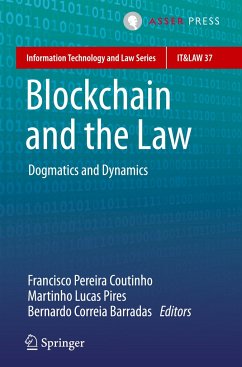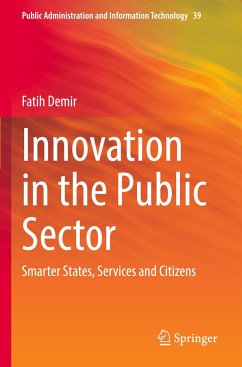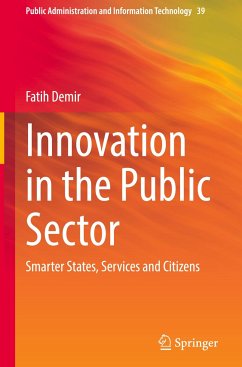
Blockchain and the Public Sector
Theories, Reforms, and Case Studies
Herausgegeben: Reddick, Christopher G.; Rodríguez-Bolívar, Manuel Pedro; Scholl, Hans Jochen

PAYBACK Punkte
53 °P sammeln!
This book discusses blockchain technology and its potential applications in digital government and the public sector. With its robust infrastructure and append-only record system, blockchain technology is being increasingly employed in the public sector, specifically where trustworthiness and security are of importance. Written by leading scholars and practitioners, this edited volume presents challenges, benefits, regulations, frameworks, taxonomies, and applications of blockchain technology in the public domain.Specifically, the book analyzes the implementation of blockchain technologies in ...
This book discusses blockchain technology and its potential applications in digital government and the public sector. With its robust infrastructure and append-only record system, blockchain technology is being increasingly employed in the public sector, specifically where trustworthiness and security are of importance. Written by leading scholars and practitioners, this edited volume presents challenges, benefits, regulations, frameworks, taxonomies, and applications of blockchain technology in the public domain.
Specifically, the book analyzes the implementation of blockchain technologies in the public sector and the potential reforms it would bring. It discusses emerging technologies and their role in the implementation of blockchain technologies in the public sector. The book details the role of blockchain in the creation of public value in the delivery of public sector services. The book analyzes effects, impacts, and outcomes from the implementation of blockchain technologies in the public sector in select case studies.
Providing up-to-date information on important developments regarding blockchain in government around the world, this volume will appeal to academics, researchers, policy-makers, public managers, international organizations, and technical experts looking to understand how blockchain can enhance public service delivery.
Specifically, the book analyzes the implementation of blockchain technologies in the public sector and the potential reforms it would bring. It discusses emerging technologies and their role in the implementation of blockchain technologies in the public sector. The book details the role of blockchain in the creation of public value in the delivery of public sector services. The book analyzes effects, impacts, and outcomes from the implementation of blockchain technologies in the public sector in select case studies.
Providing up-to-date information on important developments regarding blockchain in government around the world, this volume will appeal to academics, researchers, policy-makers, public managers, international organizations, and technical experts looking to understand how blockchain can enhance public service delivery.














